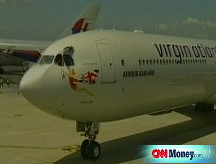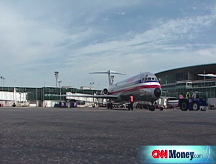Fuel prices drop, but airfares don't
Trade a fuel crisis for an economic crisis, and airlines don't want to lower ticket prices. But you can still find bargains.
NEW YORK (CNNMoney.com) -- The plunging price of jet fuel has airline passengers wondering why fares haven't plunged accordingly.
But even with lower fuel costs, the recession has put further pressure on hard-hit airlines, and that's why analysts say they're resistant to cut ticket prices or rescind fees for services that once came for free.
"When fuel prices started dropping, [airlines] were all dancing in the streets," said Tom Parsons, travel expert at BestFares.com, a fare comparison Web site. "But then in October, they got smacked by the worst recession we've ever seen."
"The airlines basically traded a fuel crisis for a global economic crisis," said Rick Seaney, Chief Executive of FareCompare.com.
Most airlines reeled this summer as jet fuel soared to $4.35 per gallon in July, which was nearly triple its price of $1.49 in January of 2007, according to Peter Beutel of energy risk management firm Cameron Hanover. Now the price is back down around $1.49, but many have yet to rescind fuel surcharges.
"Airlines were not able to keep up with the fuel price increases, so it is logical that they try to hold fares even with lower fuel prices," said Calyon Securities airline analyst Ray Neidl in an e-mail to CNNMoney.com. "Even with lower fuel prices, they are still not making money."
Overall domestic ticket prices rose 1.2% year-over-year through November, according to industry group the Air Transport Association. Other analysts agree that they rose slightly. But fuel prices in 2008 jumped 43%, and when you take discounts into account, many ticket prices went down, leaving the carriers with a lot of catching up to do.
Airlines eliminated their least fuel-efficient flights to save money, but given the economic slowdown, they're still having a hard time filling seats. In recent months the industry has slashed capacity by 10%, according to analysts, but that's been matched by a slowdown in passenger travel, which is most noticeable during the holidays. The ATA projects a 9% year-over-year decrease in the number of air travelers during the three weeks between Dec. 18 and Jan. 7.
"You're seeing softness out there that they didn't expect, and it's strictly related to economic meltdown," said Seaney of FareCompare.com. "Starting in late October, we started seeing holiday sales, which I didn't expect to see at all this year, because I expected planes to be packed after their drawdown on seats."
Seaney said discounts that have been "flooding the market since Halloween" brought down some fares by 30% to 40%. The discounts are "targeted" to specific flights and destinations, he said, unlike industrywide fare cuts.
"That's the only way you're going to see a fare decrease - through sales," said Parsons of BestFares.com, noting that the last-minute sales to fill planes gives passengers good reason to hold out for a deal, rather than buy their ticket months ahead of time. "Hold on to your cash and let them blink first."
The airlines' capacity-cutting, which was intended to alleviate the pressure of high fuel prices, had a side-benefit of softening the unexpected blow of the recession, according to Neidl of Calyon Securities.
For this reason, Neidl said he is "cautiously optimistic" about the industry's ability to achieve a profit in 2009. In an analyst note from Dec. 11, he projected that the industry will lose $4 billion in 2008 but will earn $5 billion in 2009.
"[Capacity cuts] combined with continuing lower fuel price expectations, should enable carriers to get through the economic downturn and slow winter season for a mid-year 2009 recovery," Neidl wrote.
This could also result in lower fares, said Carl Schwartz of Cheapflights.com.
"Many [airlines] are still locked into term fuel contracts based on 2008 prices [and] this is the number one reason they cannot bring air fares down," wrote Schwartz, in an e-mail to CNNMoney.com. "Once 2009 comes and new fuel contracts are negotiated, we will start to see some of the cost savings passed on to the traveler. We are already seeing it today."
Schwartz referred to the Wednesday announcements from British Airways and Virgin Atlantic Airways, which said they will reduce their surcharges to reflect reductions in the price of oil.
"This is the start of the fuel corrections," he said. ![]()



